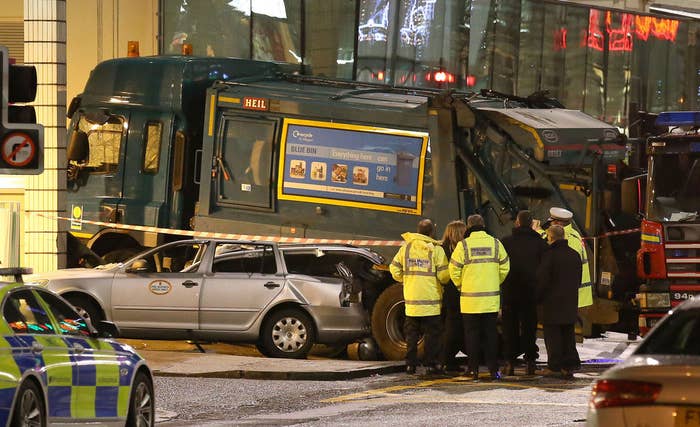
The Glasgow bin lorry crash which killed six people could have been prevented if the vehicle's driver hadn't "repeatedly lied" about his health, an inquiry into the accident has found.
On 22 December last year, driver Harry Clarke became unconscious and lost control of his vehicle which veered onto a pavement and crashed into a building in Glasgow's city centre causing the deaths of six people and injuring 15 others.
The fatal accident inquiry into the incident found that Clarke had a history of blackouts – including one incident in which he lost consciousness behind the wheel of a bus in 2010 – and he had "repeatedly lied in order to gain and retain jobs and licences".
The report, which was released on Monday, pointed to eight occasions where the fatal accident could have been prevented which all relate to the hidden truth about Clarke's health.
"Mr Clarke deceived all three doctors in the hope that he would be able to return to work sooner rather than later so that he would not lose his job with [bus company] First… None of the doctors who saw Mr Clarke advised him to notify DVLA of this event and he did not do so," wrote Sheriff John Beckett, who led the inquiry.
Beckett also said that Clarke made "inaccurate" statements in his BUPA declarations of health, both when he applied to become a minibus driver in 2010 and when he applied for the heavy goods vehicle job at Glasgow City Council a year later.

The report concludes that the accident could have been prevented if Clarke had "refrained from continuing to drive buses" and "refrained from seeking further employment as a group 2 driver in the absence of his having told the truth to doctors".
Beckett makes 19 recommendations to help prevent a similar accident from happening in the future, including making it easier to identify "repeated episodes of loss of consciousness" in medical notes of drivers, increasing the penalties of contravening the existing laws for HGV drivers, and identifying HGV routes in cities where there is likely to be a high number of pedestrians.
In a written statement, Beckett said he hoped the inquiry would prevent another fatal accident involving an HGV vehicle from taking place. "It may well be that the single most useful outcome of this inquiry would be to raise awareness of the dangers involved in driving if subject to a medical condition which could cause the driver to lose control of a vehicle," wrote Beckett.
"Guidance, including a list of relevant conditions, can be found on the DVLA website. Drivers can contact DVLA if they are not sure what to do. They can consult their doctor if they are in doubt or if they are in need of advice."
Beckett also thanked the families of the victims for taking part in the inquiry, saying: "Relatives in court managed to maintain composure, dignity and respect in circumstances which must at times have been very difficult indeed. I pay tribute to the way that they conducted themselves throughout the inquiry."
Those killed in the accident were John and Lorraine Sweeney, Erin McQuade, Stephenie Tait, Gillian Ewing, and Jacqueline Morton.
